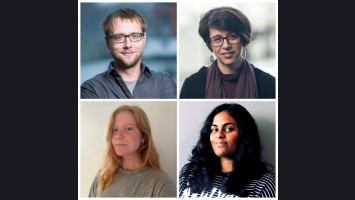Resisting Enslavement: A Global Historical Approach to Slavery in the Dutch Atlantic and Asian Empire (1620-1815)
Resisting Enslavement: A Global Historical Approach to Slavery in the Dutch Atlantic and Asian Empire (1620-1815)
Radboud University
December 18th, 2023

The ‘Resisting Enslavement’ project questions how resistance by enslaved impacted slavery and modes of enslavement in societies connected to the global Dutch colonial empire. By studying slave resistance from a global micro-historical perspective, the Resisting Enslavement project questions how different modes of enslavement impacted i) patterns of slave trade, ii) the labelling and treatment of enslaved, iii) and the social and resistance strategies of enslaved in the early modern Dutch Atlantic, Indian Ocean and Indonesian archipelago worlds. Here you can find more information on the project.
Bio
Matthias van Rossum is Senior Researcher working on Global Labour History with expertise in the dynamics of coercion, diversity, conflict and social strategy. Matthias completed his dissertation at the Vrije Universiteit Amsterdam in 2013. In his dissertation, he studied social and intercultural relations between European and Asian sailors working for the Dutch East India Company in the seventeenth and eighteenth century. This resulted in the study Werkers van de wereld (Amsterdam 2014). Earlier he received the J.R. Bruijn award (2009) for his Research Master Thesis which was published as Hand aan Hand (Amsterdam 2009). Matthias worked as lecturer in early modern social history at Leiden University (2012-2015), project leader of the Dutch Ships and Sailors project (Huygens ING, VU, 2013-2014) and as postdoc on the Labour Camps project (2014-2015).
Filipa Ribeiro da Silva is Senior Researcher and studied History at the NOVA University of Lisbon (BA Honours, 1996; MA 2001) and Leiden University (PhD, 2009). She has specialised in Social and Economic History, with a focus on Portuguese and Dutch overseas presence and interactions with Atlantic Africa. Between 2009 and 2012 Filipa was a Post-doctoral Fellow at the Wilberforce Institute for the study of Slavery and Emancipation (WISE) at the University of Hull, UK and at the International Institute of Social History (IISH) in Amsterdam, where she worked on the EURESCL Project, the Clio-Infra Project and the Global Collaboratory for the History of Labour Relations, 1500-2000. Filipa's current research interests focus on the history of Population, Labour, Migration and Trade in Sub-Saharan Africa during the pre-colonial and colonial periods.
Britt van Duijvenvoorde is a PhD Researcher at the International Institute of Social History. She obtained a Master’s degree in Philosophy at Radboud University (cum laude) and in History at Leiden University (cum laude). She focusses on the dialectic between resistance and enslavement.
Alyssa Renfurm is a PhD Researcher at the International Institute of Social History. She has a background in Sociology and obtained her degrees at the university of Rotterdam. Alyssa focuses on everyday practices and social relations in her research.